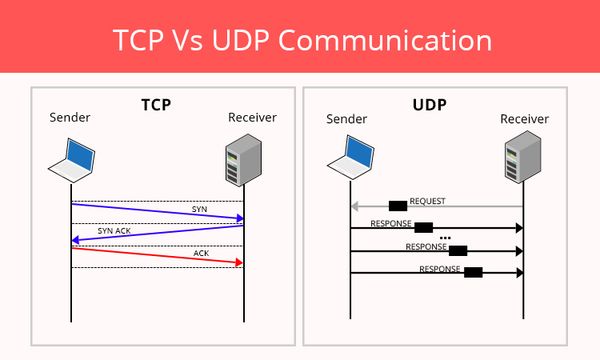
10 Algorithms Every Data Scientist Should Know
December 11, 2018
TCP/IP vs UDP: What’s the Difference?
December 17, 2018The retail industry has always been one of the most important drivers of technological advancement. Our distant ancestors recorded their profits on clay tablets before some clever shopkeeper invented the concept of numbers.
Our grandparents recorded transactions, stocks, and their customers’ accounts in large ledgers, and our parents used early spreadsheets to do the same. Today, a similar shift is taking place: instead of retailers relying on their own IT infrastructure, many are embracing cloud storage and processing.

The reasons for this are many, ranging from a desire to personalize the shopping experience to the increased security that off-site storage provides. If you are a retailer, therefore, understanding the advantages that Data Centers can bring to your business is more important than ever before. Today, let’s look at a few.
Personalization
One of the major drivers of the shift toward data centers in recent years has been the desire to personalize the shopping experience. Countless research studies have shown that, instead of being regarded (and talked to) as a demographic or group, today customers value a personal approach.
Developing a truly personalized approach, however, is challenging for the average retailer. At the very least, it requires that customers’ transaction history be recorded, in order that a retailer can offer each customer bespoke recommendations. Some retailers go further, recording huge amounts of data on their customers in order to offer an experience that is tailored specifically to them.
Recording this data, and then processing it, is simply beyond the capabilities of the average retailer. Online retail marketplace eBay processes 300 billion data queries each day (that’s 300,000,000,000), with a data footprint exceeding 500 petabytes – enough to back up the American Library of Congress more than 300 times.

While huge companies like eBay and Amazon can afford to build huge data centers to store and work with the data they generate, for most retailers the only real solution is to outsource this work and allow a company with expertise in the field to handle it.
Increased Uptime
By shifting data storage and processing off-site, retailers also achieve greater reliability. Instead of data being stored in one location, where it is at risk of being lost or damaged, the use of data center storage means that this same information is stored in multiple locations. This means that it is highly unlikely to be misplaced, and even if one server goes down it remains accessible.
This is particularly important when it comes to e-commerce. Nowadays, even small local stores do a lot of business online, and the consequences of an online store going down can be severe. Most large retailers measure their annual downtime in minutes, after all, and understand that if their website goes down customers will simply go to an alternative store.
Even if you do not generate much revenue online, therefore, it is worth looking into moving your online store to a data center. You never know when your competitors’ site is going to go down, after all, and yours is available will allow you to take advantage of this.
Scalability
Another advantage of using data centers for the retail industry is that of scalability: the ability to respond to spikes in revenue and traffic. At the broadest level, implementing a system that will allow your company to grow will save you time in the future. Rather than the stress of migrating your local systems to cloud storage in a few years, make sure you are ready to respond to increased demand before it comes.

On a smaller time-scale, many retailers value data centers because they allow them to quickly respond to anticipated or surprise spikes in customer activity. When Amazon kicked off its recent Prime Day event, shoppers purchased more than 100 million products from the site, a huge increase on their (already huge) level of sales, but one that their data centers could handle.
Data Center Security
Using data centers also brings huge advantages in terms of security. Rather than attempting to stay on top of a huge number of security vulnerabilities and cyber threats, retailers can outsource this responsibility to data storage companies who are experts in protecting the data they hold. Doing so also means that, in some cases, retailers can avoid legal responsibility for the damage caused by hacking or cybercrime.
Data security is incredibly important for retailers for two primary reasons. The first is that the financial consequences of cybercrime can be huge. A recent data breach at Target, for instance, triggered a profit loss of more than $148 million and led to their CEO resigning. With the list of potential threats growing by the day, it is likely that we will see many similar leaks in the coming years.
The second reason security is important for retailers is that customers themselves care about it. In recent years there has been an explosion in the number and sophistication of open-source security tools used by the average customer, as technologies that used to be the niche preserve of hackers become mainstream. As a retailer, this means that customers are more aware than ever before about the security of their data, and are likely to avoid retailers who are perceived to be lax with their data security.
New Technologies
Though there are therefore many practical reasons for retailers to make use of data centers, the impact of cloud storage and processing on the retail sector does not stop with mere practicality. Retailers may have moved their operations to data centers in order to achieve security, scalability, and personalization, but many are now also realizing how much more data centers can do for their business.
Take Amazon as an example. The retailers new Amazon Go concept store allows shoppers to grab items and then just walk out, a system that would be unthinkable without acres of data centers working in the background. Many other retailers are also experimenting with similar schemes, whether this is to deliver personalized marketing to shoppers as they move around a physical store or IKEA’s Place AR app that allows customers to see what furniture will look like before they buy it.
Though analysts predict such platforms won’t fully take off until at least 2022, it is worth noting that all of these advances in retail technology rely on the use of data centers. It seems, then, that data centers are here to stay, and in time will become as ubiquitous as the spreadsheet before them, and the ledger before that. And in driving the development of new retail technologies, data centers will eventually mean that those we use today will eventually seem as obsolete as clay tablets.
